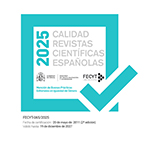A presença das mulheres nos Colóquios de Garcia de Orta: Um contributo imprescindível para o conhecimento da flora indiana
Resumen
Desde finais do século XV que chegavam à Europa promissoras notícias sobre os povos, as riquezas e os contornos geográficos da longínqua Insulíndia. Alguns europeus que viajaram até Goa, detiveram-se a observar os costumes e tradições locais nos quais as mulheres surgiam como protagonistas. Presença quotidiana na sociedade luso-goesa, as mulheres canarins, para além de zelarem pela guarda das tradições indianas eram fieis depositárias dos segredos sobre os usos alimentares e curativos da flora local. Ciente da riqueza dos saberes de que eram detentoras, Garcia de Orta (c. 1500-1568) não prescindiu de incluir uma presença feminina em Colóquios dos Simples. Tornando cada cena que descreveu, como uma representação da sua vivência em Goa, registou nos seus diálogos, os usos locais dos legumes, frutos e vegetais indianos, testemunhados e transmitidos pelas empregadas, compradeiras ou cozinheiras. O presente ensaio analisa a oportunidade da presença de cada uma das personagens femininas inscritas em Colóquios dos Simples, obra que o médico português publicou em 1563, em Goa.
Descargas
Descarga artículo
Licencia
La Revista Complutense de Historia de América, para fomentar el intercambio global del conocimiento, facilita el acceso sin restricciones a sus contenidos desde el momento de su publicación en la presente edición electrónica, y por eso es una revista de acceso abierto. Los originales publicados en esta revista son propiedad de la Universidad Complutense de Madrid y es obligatorio citar su procedencia en cualquier reproducción total o parcial. Todos los contenidos se distribuyen bajo una licencia de uso y distribución Creative Commons Reconocimiento 4.0 (CC BY 4.0). Esta circunstancia ha de hacerse constar expresamente de esta forma cuando sea necesario. Puede consultar la versión informativa y el texto legal de la licencia.











